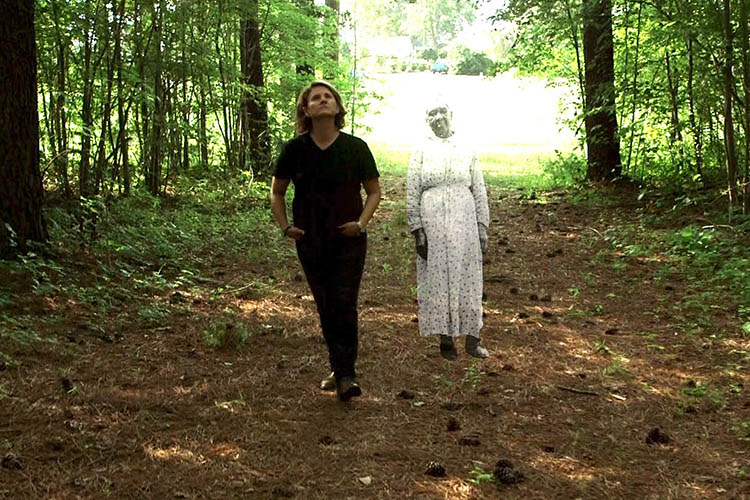Haunted by slavery, a white woman reckons with her family’s past
Her documentary film on the topic will be shown in Berkeley’s Banatao Auditorium at Sutardja Dai Hall on Wednesday, Dec. 11
December 5, 2019

A still from “The Long Shadow,” a documentary that connects the racial injustice of today with brutally dehumanizing institutions of slavery and Jim Crow. The documentary will play on the Berkeley campus Dec. 11. (Image courtesy Frances Causey)
That Frances Causey’s family owned slaves never quite sat right with her.
Since childhood, Causey disdainfully eyed the profound abuse, exploitation and grinding poverty that marked black life in her native North Carolina and throughout the South. She asked tough questions of herself, of her family and of society.
Causey’s lifelong search for answers yielded The Long Shadow, a highly acclaimed documentary that draws a strong, unmistakable line from the racial injustice of today and the brutally dehumanizing institutions of slavery and Jim Crow of yesteryear.
“I knew it wasn’t my place to tell the story of slavery and Jim Crow,” says director and co-producer Causey, who is white. “But this is a tragedy that whites must claim, and the film doesn’t pull any punches about that.”
The film, which has screened across the country, will be shown in Berkeley’s Banatao Auditorium at Sutardja Dai Hall on Wednesday, Dec. 11, as part of the campus’s yearlong initiative commemorating the 400th anniversary of the forced arrival of enslaved Africans in the English colonies.
Causey, along with professor john a. powell, director of Berkeley’s Othering and Belonging Institute, formerly the Haas Institute for a Fair and Inclusive Society, will host a panel discussion following the screening. powell and Berkeley Law professor Ian Haney López are both interviewed in the 87-minute film. Watch the discussion below.
As the country’s racial divisions are thrown into sharp relief, the film’s message of justice and equality are especially relevant, says Denise Herd, associate director of the Othering and Belonging Institute and a public health professor.
“’The Long Shadow’ touches on critical themes that all Americans need to understand about the enduring harms of slavery and its aftermath,” says Herd, lead organizer of the campus’s 400 Years of Resistance to Slavery and Oppression initiative. “The film makes us aware that living descendants of slaveholders who benefited greatly from this system have an urgent responsibility to help heal the nation and support the human, social and economic rights of descendants of formerly enslaved peoples.”
In a life shaped by her unquestioned white supremacy, Causey admits to having had to confront her own “inherent tribalism and racism” on her journey through life and toward production of the film. Her family on both sides owned slaves, and that history, coupled with being a daily witness to the social, political and economic disenfranchisement of black people, haunted her, she says.
Many white people, Causey says, are so invested in beliefs and ideas around their superiority and black inferiority that even having a discussion about racial justice or inequality is a non-starter.
“We’ve got to address this white fragility,” she says. “Really, what are we fighting so hard against? Instead, let’s give more thought to what an equitable society would look like.”
For example, Causey points to the nation’s history of preventing the accumulation of wealth for black families — either through policy or violence, or both — resulting in a lopsided, stubborn persistence in the racial wealth gap that has been institutionalized and normalized. Today, the mean of black household wealth is $138,200 — for whites, it’s $933,700, according to a recent report.
“We can’t just wipe out that effect overnight,” she says. “Our thinking needs to be, ‘If you win, I win.’ Not, ‘I need to win at your expense.’’’
The film has been shown around the country to critical review. Perhaps not surprisingly, Causey says, arranging screenings in the South has been markedly challenging. She’s convinced that anti-black racism remains so deeply embedded there that “they can’t see their way clear of it, they can’t ever really talk about it.”
Still, Causey says, the film, overall, is having the impact on audiences that she had hoped, though she laments that there remains a significant swath of the country (30 to 35% in her estimation) that will forever hold on to hardcore racists beliefs, despite verifiable facts to the contrary.
So, was it worth the journey?
“I finally made the film that I had to make,” she says. “I can die happy.”
The screening of The Long Shadow is a part of a series of films that will be shown next semester to highlight important themes in African American history. Visit 400years.berkeley.edu/events for more information. The film will be broadcast on PBS stations across the United States in 2020 during Black History Month. Check your local listings.